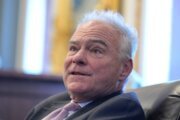J.J. Green, wtop.com
Part II
WASHINGTON – Hundreds of thousands of people will line the inaugural parade route Monday and many more will watch remotely.
Security experts say it’s the hands of people in the crowds and those typing hostile commands on computer keyboards and devices far from the National Mall that worry them.
Both are equally troubling for the Secret Service and its 41 partner agencies, who are responsible for securing the 1.2-mile stretch of Pennsylvania Avenue used for the inaugural parade.
“You’re literally worried about the hands reaching out to touch your protectee and making sure there’s nothing in them,” says Fred Burton, a former diplomatic security agent for the State Department.
Multiple rings of security, designed to weed out people who may represent a threat to the president and the first family, take months to plan and design.
“In essence, what happens is they pull the off-the-shelf protection plan and update all the current threats that may impact the present-day situation and you have a baseline or framework to work from,” says Burton.
The Secret Service did not grant WTOP an interview but sanctioned its former director, Ralph Basham – who spoke from a position of knowledge about their operations – to speak for the service.
Basham says for the Secret Service, the preparations are almost as important – or more so – than the event itself.
The agents in the president’s inner security circle “are not there to watch the activities that are going on with the president and first lady and others, they’re there to observe what is happening in the crowds along the route.”
And while they are busy checking the hands of people reaching out to touch the president, Burton says other police and federal law enforcement agencies have already taken care of some responsibilities, including “sweeps for the improvised explosive devices, (making sure) that the vehicles have been checked, that the venues have been checked and posted and the counter-sniper team is on their A-game that day.”
Threats from afar
Keeping their eyes on suspicious people and potentially disruptive situations along the route is but one concern for security officials. Another concern is those who want to disrupt the event from afar.
Basham says cyber technology and weapons of mass destruction — such as chemical, biological, radiological, and nuclear threats — are all concerns. But, he says, “There are systems in place the Secret Service uses today that mitigate those problems.”
The FBI is responsible for a great deal of that threat mitigation.
According to a spokesperson, “The FBI is the lead federal agency for crisis management, counterterrorism and hostage rescue as well as intelligence analysis during a National Special Security Event. As such, we will have specialized agents, intelligence analysts and other personnel positioned to provide on-scene command and response capability.”
Learning from the past
Each inauguration is a security building block for the next.
“Each time we conduct a large-scale security event like the inauguration or any other (National Special Security Event), we conduct an after-action review to learn and improve the plan,” the FBI spokesperson says.
Well-wishers and parade-goers will not notice or recognize the vast majority of the men and women providing security for the swearing-in and parade. They will blend into the crowds and quietly patrol the perimeter of each inaugural venue, which is normal, the FBI spokesperson says.
“Every day, all of the agencies represented on the Joint Terrorism Task Force, work to protect the nation from terrorist activity. In the same manner with our partner agencies, we are implementing a security plan that accounts for any contingency that we may face,” the FBI spokesperson says.
The ultimate concern comes when the president exits his car, which in years past caught the Secret Service by surprise.
“It’s only, in my memory, happened one time that we did not anticipate that,” Basham says, referring to the 1993 emergence of President Bill Clinton.
But the Secret Service has a balancing act to perform.
“The big challenge, particularly when it comes to protecting the president of the United States, is you have to ensure his security and the security of those around him,” Basham says. “But you also have to let him go about the people’s business.”
Related Stories:
Follow @JJGreenWTOP and @WTOP on Twitter.
(Copyright 2013 by WTOP. All Rights Reserved.)







